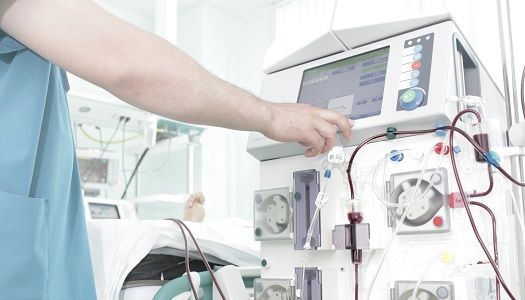DAAs Offer More Options for Treating Dialysis Patients with Hepatitis C
Renal failure complicates hepatitis C treatment, but there's options.

Researchers reviewed the available literature regarding novel treatment of hepatitis C infection in patients with renal failure. They found that the standard treatment for those with genotype 1 hepatitis C should likely be switched from interferon (INF)-based therapies to INF-free direct-acting antiviral (DAA) therapies.
Patients with hepatitis C infection on hemodialysis, or kidney dialysis, face a significantly worse prognosis than those who are not on the treatment. INF-based therapy has been the standard treatment for patients with severe renal dysfunction with hepatitis C, but the team from Hokkaido University in Japan said, “this therapy remains incapable of achieving a high rate of sustained viral response (SVR), even for patients with normal renal function.” Additionally, INF-based therapies carry a risk of adverse events, particularly for patients with renal dysfunction.
Trials of DAA-based therapies, which are INF-free, have shown significant improvements in SVR, but the authors noted that patients with severe renal dysfunction are largely excluded from such trials. Recent studies have shown that INF-free therapies are safe and efficient for patients with severe renal dysfunction, and their review focused on both traditional and novel treatments for patients with both severe renal dysfunction and hepatitis C infection.
Previous to the advent of DAAs, the recommended treatment of hepatitis C was pegylated (PEG)-INF therapy for patients with renal dysfunction. However, for those with severe renal dysfunction, hemodialysis cannot remove INF from the blood due to its high molecular weight. The reviewers looked at studies that examined both PEG-INF monotherapy and INF combined with ribavirin (RBV). In both types of treatment, the kidneys were unable to eliminate the substances in patients with severe renal dysfunction, so they were determined unsatisfactorily safe or efficient.
The authors noted that for patients receiving hemodialysis as well as DAA therapy, clinicians must pay special attention to drug-drug interactions and exercise caution. They reviewed studies investigating the use of grazoprevir and elbasvir combination therapy, paritaprevir (PTV)/ritonavir, ombitasvir (OBV), and dasabuvir (DSV) with without RBV, asunaprevir (ASV) and daclatasvir (DCV) combination therapy, and sofosbuvir-based therapy.
Grazoprevir and elbasvir combination therapy in patients with renal dysfunction is safe and effective, as is PTV/ritonavir/OBV with or without DSV, according to the report. The team described DCV/ASV as being “highly effective and safe for patients with severe renal dysfunction.” Sofosbuvir is effective and has a high genetic barrier, however, the reviewers said that data for sofosbuvir in patients with severe renal dysfunction is still pending.
“If a good prognosis is expected, dialysis patients with genotype 1 hepatitis C infection should be considered for DAAs therapy,” the team concluded, but added that in cases other than genotype 1 hepatitis C, “waiting for the next generation DAAs would be the optimal treatment option.” Clinical trials for those next generation DAAs are currently underway.
The full review, “Novel Treatment of Hepatitis C Virus Infection for Patients with Renal Impairment,” can be found in the Journal of Clinical and Translational Hepatology.
Related Coverage:
Clinical Transplantation Trial Tests Use of Hepatitis C-Infected Kidney
New Report Questions Safety of Hepatitis C Drugs
Phase 4 Real-World Study Assesses Simeprevir for Hepatitis C